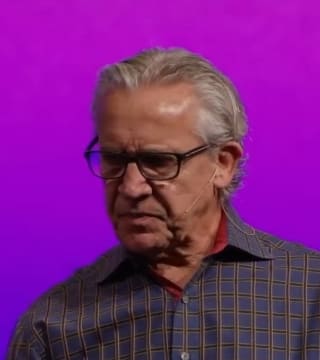Bill Johnson - The Key to Emotional Health (07/22/2025)
He didn’t say, «Shout for joy, all you extroverts, and all you introverts, just think happy thoughts. I’m good; I’m good! Just feel warm and fuzzy about me. I’m fine; I’ll work with that.» He didn’t say that. He said, «Shout for joy! Shout for joy!» Period. There’s something about that expression that changes our capacity to experience what God is doing and what He’s about to do: «Rejoice always; pray without ceasing; in everything give thanks.»
So as I lay there, I start having this sense that the key to emotional health is rejoicing always. Here’s the strange thing about it—in fact, let me refer to Thanksgiving because it’s more visual. I’m not a great golfer; it’s been a while since I’ve gone. I have some funny stories about my golfing expertise, but I use this as an analogy: the ball is here, you have your backswing, you meet the ball, and it goes forward. This is yesterday; this is today. The momentum shows you where you’re going tomorrow. I don’t know if that made sense, but you’ve got your backswing, you meet the ball, and your club doesn’t go that way; it goes this way. There’s a momentum created when you are thankful.
«God, you provided for me when I didn’t deserve it. I made dumb financial decisions, yet you covered me anyway. You provided; you healed my body; here, God, you used a doctor. I was in crisis, expecting you to show up in a certain way, but you didn’t; however, you never left me, and you walked me through that into triumph.» As you go through all these things, what’s happening is that you are reviewing your yesterday and God’s faithfulness, which causes you to automatically sense where you’re heading. Does that make sense? You automatically begin to sense, «This is my tomorrow.» Why? Because before there’s a problem, He creates a solution.
One of the most astonishing things in Scripture to me is where it says Jesus was crucified before the foundations of the world. Jesus was crucified before the foundations of the world. Before all this was created, including humans, He was crucified. The point is, before there was sin, there was a Savior. Before there was a problem, there was a solution. So, what in your life could you come up with that He didn’t already have a solution for? The reason for thankfulness is truly astonishing. Thankfulness helps create hope—and you know what hope is? Hope is the joyful anticipation of good. Joyful and excited about what’s about to happen.
What this means is that hope gives us the opportunity to enjoy the emotional benefit of a miracle before it happens; we actually have the opportunity to explore the emotion of victory before victory occurs. We get to draw on the emotion of victory; hope gives us access to that, and it’s Thanksgiving that creates that momentum. So here we have this issue: rejoicing is the key to emotional health. Rejoicing in any situation, every situation. I believe strongly that these kinds of expressions require a physical response.
He didn’t say, «Shout for joy, all you extroverts and all you introverts; just think happy thoughts. I’m good; I’m good! Just feel warm and fuzzy about me. I’m fine; I’ll work with that.» He didn’t say that. He said, «Shout for joy! Shout for joy!» Period. There’s something about the expression that changes our capacity to experience what God is doing and what He’s about to do. There’s something transformed in us through physical outward obedience. Sometimes it’s kneeling; sometimes it’s laying on your face; sometimes it’s raising hands; sometimes it’s a dance.
Goodness, I’ll never forget the first time I danced before the Lord. I was alone in a house, worshiping, when I felt like the Lord said to dance. I was so embarrassed—I made sure all the curtains were closed because I knew that all the news networks were there, wanting to film this great event about to happen. I actually went and made sure all the curtains were closed; everything. And I’m the only one in the house—the lights are very dim, you can hardly see. I go and I have to admit I actually felt kind of good inside, so I did it again and again and again. Eventually, you don’t care what anybody thinks, but at that time, it really mattered to me. There had to be some sort of physical response.
Like Wigglesworth says, «My body doesn’t tell me how it’s feeling; I tell my body how it’s feeling.» There are times when they’re not monumental things. They’re not God commanding us to do something impossible; sometimes it’s a simple thing: raise your hand; sometimes it’s lift your voice; sometimes it’s give what’s in your pocket to that person in need. None of them are huge, noble tasks, but they all require some sort of external obedience, and rejoicing is just like that. I think rejoicing takes great faith. I think it’s easier to hang your head and sing a song about God’s word than it is to celebrate His worth because you actually have to have some sense of confidence that you are accepted to rejoice. And He says, «Rejoice always.»

